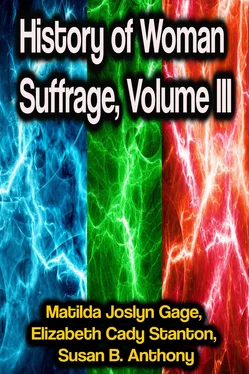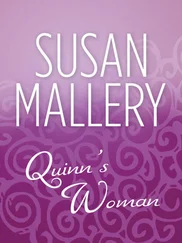Rev. Olympia Brown believed that a proper interpretation of the fourteenth and fifteenth amendments did confer suffrage on women. But men don't so understand it, and as a consequence when Mahomet would not come to the mountain the mountain must go to Mahomet. She said the day was coming, and rapidly, too, when women would be given suffrage. There were very few now who did not acknowledge the justice of it.
Isabella Beecher Hooker gave her idea on "A Reconstructed Police," showing how she would rule a police force if in her control. Commencing with the location of the office, she proceeded with her list of feminine and masculine officers, the chief being herself. She would have a superintendent as aid, with coördinate powers, and, besides the police force proper, which she would form of men and women in equal proportions; she would have matrons in charge of all station-houses. Her treatment of vagrants would be to wash, feed, and clothe them, make them stitch, wash and iron, take their history down for future reference, and finally turn them out as skilled laborers. The care of vagrant children would form an item in her system.
Mrs. Lawrence of Massachusetts, said the country is in danger, and like other republics, unless taken care of, will perish by its own vices. She said twelve hundred thousand men and women of this country now stand with nothing to do, because their legislators of wealth were working not for the many, but the few, drunkenness and vice being superinduced by such a state of things. She insisted that women were to blame for much of the evil of the world—for bringing into life children who grow up in vice from their inborn tendencies.
Dr. Caroline B. Winslow of Washington, referred to the speech of Mrs. Lawrence, saying she hoped God would bless her for having the courage to speak as she did. There is no greater reform than for man and woman to be true to the marital relations.
Belva A. Lockwood said the only way for women to get their rights is to take them. If necessary let there be a domestic insurrection. Let young women refuse to marry, and married women refuse to sew on buttons, cook, and rock the cradle until their liege-lords acknowledge the rights they are entitled to. There were more ways than one to conquer a man; and women, like the strikers in the railroad riots, should carry their demands all along the line. She dwelt at length upon the refusal of the courts in allowing Lavinia Dundore to become a constable, and asked why she should not be appointed.
The Rev. Olympia Brown said that if they wanted wisdom and prosperity in the nation, health and happiness in the home, they must give woman the power to purify her surroundings; the right to make the outside world fit for her children to live in. Who are more interested than mothers in the sanitary condition of our schools and streets, and in the moral atmosphere of our towns and cities?
Marshal Frederick Douglass said his reluctance to come forward was not due to any lack of interest in the subject under discussion. For thirty years he had believed in human rights to all men and women. Nothing that has ever been proposed involved such vital interests as the subject which now invites attention. When the negro was freed the question was asked if he was capable of voting intelligently. It was answered in this way: that if a sober negro knows as much as a drunken white man he is capable of exercising the elective franchise.
Lavinia C. Dundore, introduced as the lady who had made application for an appointment as a constable and been refused, made a pithy address, in which she alluded to her recent disappointment.
Matilda Joslyn Gage spoke of the influence of the church on woman's liberties, and then referred to a large number of law books—ancient and modern, ecclesiastical and lay—in which the liberties of woman were more or less abridged; the equality of sexes which obtained in Rome before the Christian era, and the gradual discrimination in favor of men which crept in with the growth of the church.
Mrs. Devereux Blake said there is no aspect of this question that strikes us so forcibly as the total ignoring of women by public men. However polite they may be in private life, when they come to public affairs they seem to forget that women exist. The men who framed the last amendment to the constitution seemed to have wholly forgotten that women existed or had rights.... Huxley said in reply to an inquiry as to woman suffrage, "Of course I'm in favor of it. Does it become us to lay additional burdens on those who are already overweighted?" It is always the little men who oppose us; the big-hearted men help us along. All in this audience are of the broad-shouldered type, and I hope all will go out prepared to advocate our principles. In reply to the objection that women do not need the right to vote because men represent them so well, she asked if any man in the audience ever asked his wife how he should vote, and told him to stand up if there was such a one. [Here a young man in the back part of the hall stood up amidst loud applause.]
The various resolutions were discussed at great length and adopted, though much difference of opinion was expressed on the last, which demands that intelligence shall be made the basis of suffrage:
Resolved , That the National Constitution should be so amended as to secure to United States citizens at home the same protection for their individual rights against State tyranny, as is now guaranteed everywhere against foreign aggressions.
Resolved , That the civil and political rights of the educated tax-paying women of this nation should take precedence of all propositions and debates in the present congress as to the future status of the Chinese and Indians under the flag of the United States.
Whereas, The essential elements of justice are already recognized in the constitution; and, whereas, our fathers proposed to establish a purely secular government in which all forms of religion should be equally protected, therefore,
Resolved , That it is preëminently unjust to tax the property of widows and spinsters to its full value, while the clergy are made a privileged class by exempting from taxation $1,500 of their property in some States, while in all States parsonages and other church property, amounting to millions of dollars, are exempted, which, if fairly taxed, would greatly lighten the national debt, and thereby the burdens of the laboring masses.
Resolved , That thus to exempt one class of citizens, one kind of property, from taxation, at the expense of all others, is a great national evil, in a moral as well as a financial point of view. It is an assumption that the church is a more important institution than the family; that the influence of the clergy is of more vital consequence in the progress of civilization than that of the women of this republic; from which we emphatically dissent.
Resolved , That universal education is the true basis of universal suffrage; hence the several States should so amend their constitutions as to make education compulsory, and, as a stimulus to the rising generation, declare that after 1885 all who exercise the right of suffrage must be able to read and write the English language. For, while the national government should secure the equal right of suffrage to all citizens, the State should regulate its exercise by proper attainable qualifications.
On January 10, 1878, our champion in the Senate, Hon. A. A. Sargent, of California, by unanimous consent, presented the following joint resolution, which was read twice and referred to the Committee on Privileges and Elections:
Joint Resolution proposing an Amendment to the Constitution of the United States .—
Resolved by the Senate and House of Representatives of the United States of America in congress assembled, two-thirds of each House concurring therein, That the following article be proposed to the legislatures of the several States as an amendment to the Constitution of the United States, which, when ratified by three-fourths of the said legislatures, shall be valid as part of the said constitution, namely:
Читать дальше












